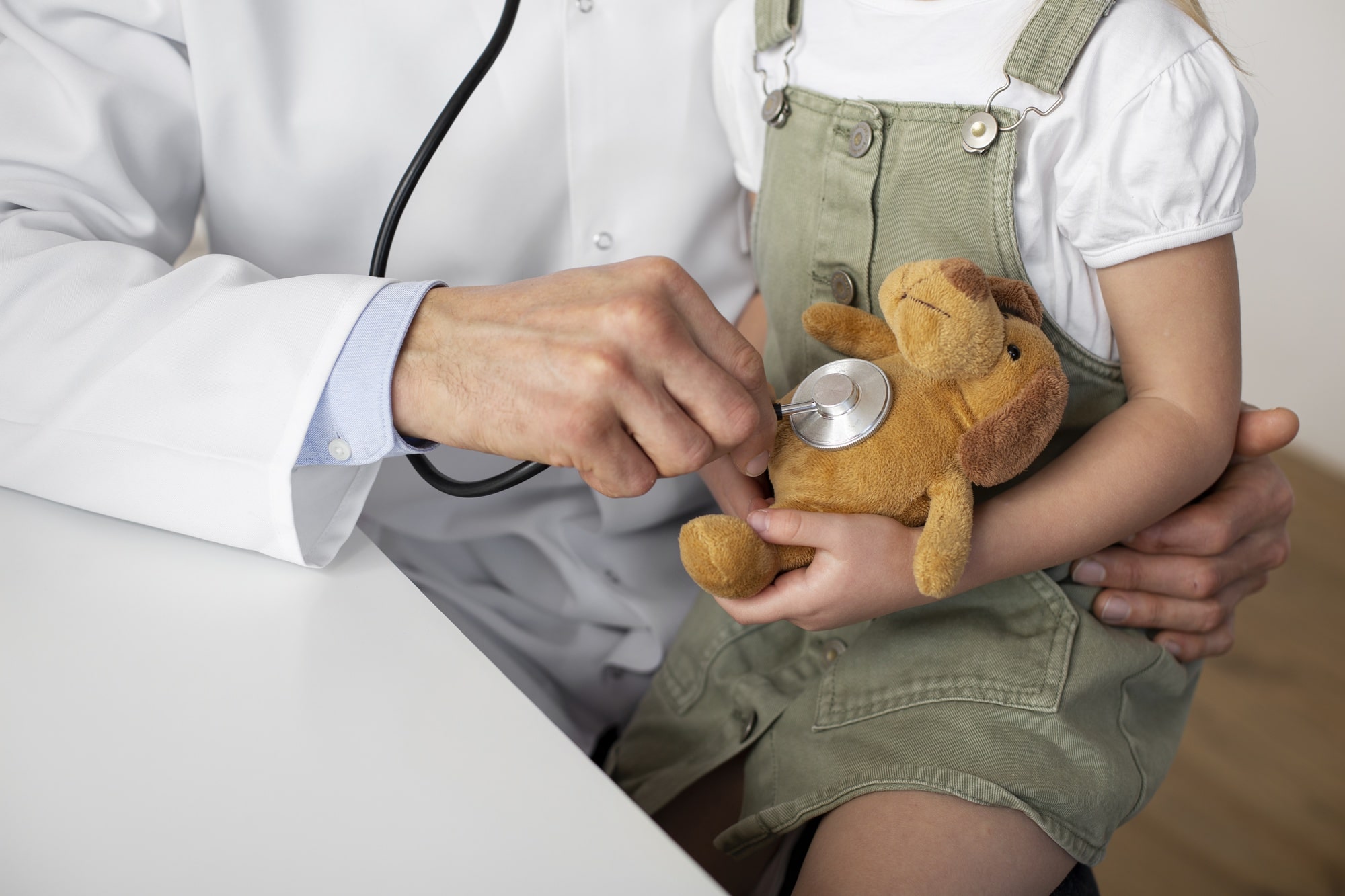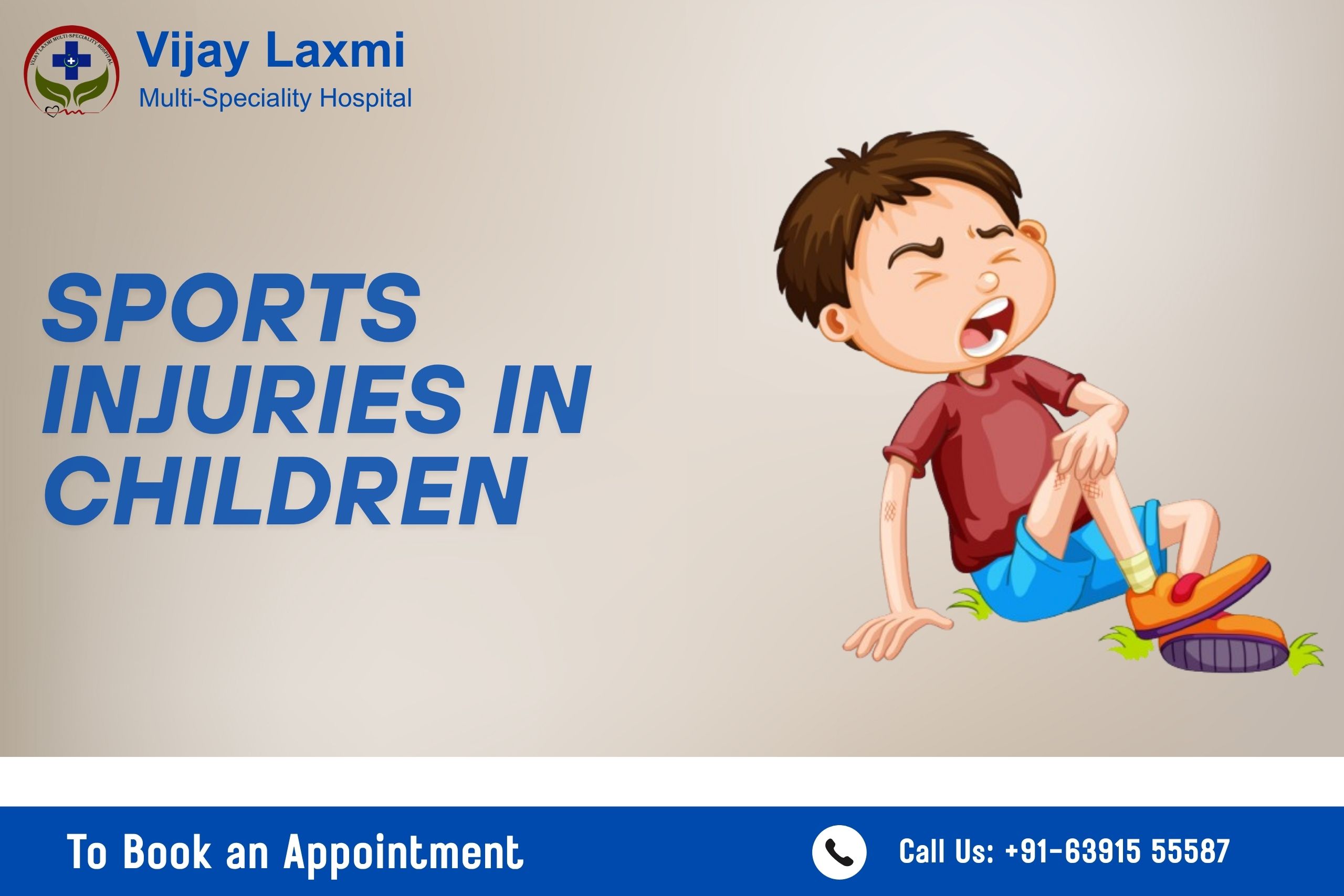
Common Childhood Illnesses and When to See a Pediatrician
Kids get sick, it’s just a fact of life, and it can be really worrying for us parents. We often wonder, “Is this just a little bug, or something more serious?” Most of the time, a little TLC (tender love care) at home does the trick, but sometimes, you need a doctor’s help to make sure things don’t get worse. Knowing what to look for when your child is unwell can make a huge difference.
That’s why, in this article, the children’s doctors at Vijay Laxmi Multi-Speciality Hospital are going to break down the common illnesses kids get, what those illnesses look like, and when it’s time to call the pediatrician. We’ll help you feel more confident in taking care of your little ones.
Common Childhood Illnesses and Symptoms:
Children’s immune systems are still developing, making them more susceptible to infections. Below are some of the most frequent illnesses seen in pediatric care:
1. Cold & Flu:
- Symptoms: Runny nose, cough, sneezing, sore throat, mild fever, body aches.
- Cause: Viral infections (commonly rhinovirus or influenza virus).
- Treatment: Rest, hydration, saline nasal drops, and fever management with pediatrician-recommended medication.
When to See a Pediatrician:
- If symptoms persist beyond 10 days.
- If there is difficulty breathing or persistent wheezing.
- If the child has a high fever (above 102°F) that does not respond to medication.
2. Ear Infections:
- Symptoms: Ear pain, irritability, trouble sleeping, fever, fluid drainage from the ear.
- Cause: Bacterial or viral infections affecting the middle ear.
- Treatment: Pain relievers, warm compresses, and antibiotics if prescribed by a pediatrician.
When to See a Pediatrician:
- If pain persists beyond 48 hours.
- If there is fluid draining from the ear.
- If the child experiences hearing difficulties.
3. Fever:
- Symptoms: Elevated body temperature (above 100.4°F), chills, sweating, fatigue, irritability.
- Cause: Viral or bacterial infections, teething (mild fever), immunization response.
- Treatment: Fever-reducing medication (as prescribed), lukewarm sponge baths, and hydration.
When to See a Pediatrician:
- If a newborn (under 3 months) has a fever above 100.4°F.
- If fever lasts more than 3 days or repeatedly spikes above 102°F.
- If the child shows signs of dehydration, lethargy, or seizures.
4. Stomach Infections (Diarrhea & Vomiting):
- Symptoms: Loose stools, vomiting, stomach cramps, dehydration.
- Cause: Viral gastroenteritis, bacterial infections, food poisoning.
- Treatment: Oral rehydration solutions (ORS), probiotics, bland diet (BRAT – Bananas, Rice, Applesauce, Toast).
When to See a Pediatrician:
- If diarrhea or vomiting lasts more than 24 hours.
- If the child refuses to drink fluids and shows signs of dehydration (dry mouth, sunken eyes, no urination for 6+ hours).
- If stool contains blood or mucus.
5. Allergies & Asthma:
- Symptoms: Runny nose, sneezing, itchy eyes, cough, wheezing, difficulty breathing.
- Cause: Triggers like pollen, dust, pet dander, or food allergens.
- Treatment: Allergy medications, inhalers (for asthma), and avoiding known triggers.
When to See a Pediatrician:
- If the child experiences persistent breathing difficulty or wheezing.
- If symptoms worsen despite allergy medication.
- If an allergic reaction leads to swelling of the face or difficulty swallowing (emergency care needed).
6. Hand, Foot, and Mouth Disease (HFMD):
- Symptoms: Fever, painful mouth sores, skin rash (often on hands and feet).
- Cause: Viral infection (coxsackievirus).
- Treatment: Symptom management with hydration, pain relief, and maintaining hygiene.
When to See a Pediatrician:
- If the child refuses to eat or drink due to mouth sores.
- If the fever is high and persistent.
- If symptoms worsen or do not improve within a week.
7. Chickenpox & Measles:
- Symptoms: Fever, rash (red spots or blisters for chickenpox, flat red spots for measles), fatigue.
- Cause: Viral infections (Varicella-zoster for chickenpox, measles virus).
- Treatment: Symptom management, rest, fluids, and antihistamines for itching.
When to See a Pediatrician:
- If there are complications like secondary infections (severe skin infections, pneumonia).
- If the child has difficulty breathing, persistent high fever, or drowsiness.
- If there are neurological symptoms like confusion or seizures.
Preventive Measures for Childhood Illnesses:
Okay, let’s talk about keeping our kids healthy and strong! We all want to protect them from those nasty childhood illnesses, right? Think of these tips as your superhero toolkit against germs and sickness.
- Vaccinations: Your Child’s Shield: Imagine vaccinations as tiny superheroes that train your child’s body to fight off serious diseases. Following the vaccination schedule your doctor recommends is like giving them a full suit of armor. It’s one of the best ways to protect them from things like measles, chickenpox, and whooping cough.
- Handwashing: The Superpower of Clean: You know how important washing your hands is, right? Well, it’s super important for kids too! Teach them to wash their hands often, especially before meals and after using the bathroom. Think of it as washing away those invisible little germ monsters. Make it fun with songs and colorful soaps!
- Healthy Food: Fuel for Super Strength: Just like cars need the right fuel, kids need the right food to grow strong and healthy. A balanced diet with lots of fruits, veggies, and whole grains helps build a strong immune system, which is like their own personal army against sickness.
- Sleep: The Body’s Recharge Time: When kids sleep, their bodies work hard to repair and rebuild. Getting enough sleep is like giving their immune system a chance to recharge and get ready for the day. So, make sure they get plenty of rest!
- Staying Away from Sick Friends: Creating a Germ-Free Zone: It’s tough when your little one wants to play, but if their friends are sick, it’s best to keep them apart for a while. Especially during flu season, minimizing contact with sick people helps prevent the spread of germs. It’s like building a little germ-free zone around your child.
WHO Data on Child Health in India:
Ensuring children’s health in India requires attention to both nutrition and immunization.India Today
Dietary Diversity Among Indian Children:
According to a study published in The Hindu, approximately 77% of Indian children aged 6-23 months lack the dietary diversity recommended by the World Health Organization (WHO). The WHO’s Minimum Dietary Diversity (MDD) score considers a child’s diet diverse if it includes at least five food groups, such as breastmilk, eggs, legumes, nuts, fruits, and vegetables. States like Uttar Pradesh, Rajasthan, Gujarat, Maharashtra, and Madhya Pradesh report over 80% of children with inadequate diet diversity, while Sikkim and Meghalaya have rates below 50%. The study emphasizes the need for a holistic governmental approach, including an improved public distribution system and intensified Integrated Child Development Services (ICDS), to address this issue. The Hindu+1Business & Finance News India+1Business & Finance News India+1The Hindu+1
Immunisation Coverage in India:
On a positive note, India has made significant strides in child immunization. As reported by India Today, the country achieved a 93% coverage for the third dose of diphtheria, pertussis, and tetanus (DPT3) vaccines in 2022, surpassing the pre-pandemic high of 91% in 2019. This marks a rapid increase from 85% in 2021. The WHO commends these efforts but emphasizes the need to focus on vaccinating the remaining unvaccinated and partially vaccinated children to prevent outbreaks of vaccine-preventable diseases. The Hindu+2India Today+2Business & Finance News India+2
Addressing dietary deficiencies and maintaining high immunization rates are crucial steps toward improving child health outcomes in India.
How Vijay Laxmi Multi-Speciality Hospital Can Help?
Think of Vijay Laxmi Multi-Speciality Hospital as a friendly, helpful place dedicated to keeping your kids healthy. We know being a parent can be tough, especially when your little one isn’t feeling well, and we’re here to help you every step of the way.
Let me introduce you to Dr. Gunjan Patel. She’s not just a doctor, she’s a mom’s best friend! Dr. Gunjan Patel is a really experienced children’s doctor, or pediatrician, who truly cares about your child’s well-being. She’s great at figuring out what’s wrong and explaining it to you in a way that’s easy to understand. She also loves helping parents learn how to keep their kids healthy in the first place.
Here’s how we can help your family at the hospital:
- Baby’s First Steps: Newborn and Infant Checkups: We’ll be there from the very beginning, ensuring your newborn gets the best start in life with regular checkups. It’s like having a guide for those precious early months.
- Building a Strong Shield: Vaccinations and Immunizations: We make sure your child gets all their vaccinations on time, protecting them from serious illnesses. Think of it as building a strong shield around them.
- Solving the Mystery: Diagnosis and Treatment of Childhood Infections: When your child gets a fever, cough, or any other kind of infection, we’ll figure out what’s going on and get them the right treatment quickly. We’re like detectives, solving the mystery of what’s making them unwell.
- Breathing Easy: Allergy and Asthma Management: If your child struggles with allergies or asthma, we’ll work with you to create a plan to help them breathe easier and live a full, happy life.
- Always There: 24/7 Emergency Pediatric Care: Kids don’t always get sick during regular office hours, and we get that! That’s why we offer 24/7 emergency care. You can always count on us, day or night.
Frequently Asked Questions (FAQs):
1. What are the most common childhood illnesses?
The most common childhood illnesses include colds, flu, ear infections, fever, stomach infections, allergies, asthma, hand-foot-mouth disease, chickenpox, and measles.
2. When should I take my child to a pediatrician for a fever?
You should see a pediatrician if:
- A newborn (under 3 months) has a fever above 100.4°F.
- A fever lasts more than 3 days or repeatedly spikes above 102°F.
- The child shows signs of dehydration, lethargy, or seizures.
3. How can I prevent common childhood illnesses?
Preventive measures include regular vaccinations, proper handwashing, a balanced diet, adequate sleep, and avoiding exposure to sick individuals.
4. How do I know if my child has an ear infection?
Signs of an ear infection include ear pain, irritability, trouble sleeping, fever, and fluid drainage from the ear.
5. Is vomiting and diarrhea in children serious?
Vomiting and diarrhea can lead to dehydration, which is serious. See a pediatrician if:
- Symptoms last more than 24 hours.
- The child refuses to drink fluids.
- There is blood or mucus in the stool.
Worried about your child’s health? Book a consultation with Dr. Gunjan Patel today!
Conclusion:
Okay, let’s wrap this up with some reassuring words. We know kids get little sniffles and tummy aches, and most of the time, they bounce back quickly. But sometimes, those little things can turn into bigger problems if we don’t pay attention. Knowing when to call the doctor is like having a superpower – it helps you keep your child safe and healthy.
If you’re ever worried about your child’s health, even if it seems like a small thing, please don’t hesitate to reach out to Dr. Gunjan Patel at Vijay Laxmi Multi-Speciality Hospital. She’s there to help you figure things out and make sure your child gets the care they need. Catching things early and getting expert advice can make a huge difference in how quickly your child feels better and how well they do in the long run.
We understand that your child’s health is your number one priority, and it’s our top priority too! We’re here to support you and your little one every step of the way. So, if you have any questions or concerns, please schedule a consultation today. Let’s work together to keep your child happy and healthy!











